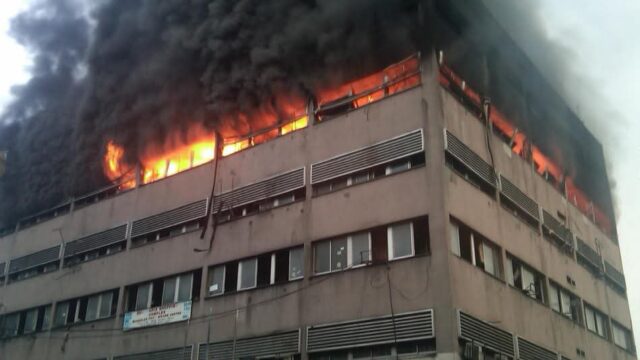By Nik Ogbulie
It is very sad episode!. A gory optic of some sought…! It is horrifying to watch human beings cascading from high-rise building, like debris from an escarpment; with by-standers waiting to take them to the morgue, confirming their levels of helpless in a country that is soaked with oil and gas and inhabited by over 220 million people of various skills and powers and principalities. In this period of AI occupation and destuption, not many believed that Nigerians who woke up from their homes to work could suffer the horror of a blaze that lasted just for few hours in a district considered Nigeria’s biggest business and financial environment; about 100 meters north from the Lagos annex of the Central Bank of Nigeria, 50 meters south from the head office of a financial institution that prides itself ‘Africa’s global bank’ and less than 500 meters from the country’s largest sea port and the biggest retail market in West Africa.
It was a failure of ingenuity if all these humongous institutions exist in such an environment with little or no cover, maybe, only the insurance cover from the seeming under-capitalized insurance companies which still bear no resounding strength. It is also a moral failure for institutions and their owners to continue to cultivate businesses with public funds without taking into consideration the rate of hazards that lock around the place, even as much as it is a careless miscalculation for government to continue to enforce some obnoxious laws in such areas where peoples’ lives and properties remain highly in danger.
This kind of development that takes large human lives and business questions the ingenuity of many corporate institutions and governments that pretend to be growing social responsibility demands in a country that its government lacks the capacity to maintain lives and property to a level that can improve business growth. This fire scandal which is a sad narrative in the history of Nigeria’s old capital city tries to cast very gloomy optics to a state whose annual revenue (both earned and unearned) is known to have been bigger than those of Ghana, Togo and Benin republics put together. The narrative even becomes so disappointing when a huge number of the investments around the main point of reference can as well boast of so many private jets and helicopters even when not even one fire-fighting aircraft can be deployed to cater for the entire Lagos Island, where about 75% of the revenue in Lagos metropolis resides. Many angry Nigerians blame the financially bullish Lagos State government for not being able to protect its financial centres with lively fire-fighting equipment, but a lot still believe that the Lagos Central Business District which is the home of over 40 banks and other financial institutions, as well as head offices of many petroleum companies has been abandoned to the whims and caprices of rude and wicked environmental hazards, most of which are easily contained by modern technology. The simple logic is that Nigerian business owners are a group of unconcerned and irresponsible operators whose business ideas have largely remained short of global standards. This is simply why there is no determined effort to put off the fire in a matter of minutes in an environment that harbours some of the critical government or public financial institutions.
The ownership of the structures involved does not matter to Nigerians, what matters is the wanton loss of lives, mainly lives of poor Nigerians who wallow about on daily basis in search of survival, but subjected to worst work environments, mostly owned by very rich Nigerians who can only consider it expedient to provide safety materials only in their homes. This could only happen in a country or state that has been captured by corruption and other tendencies that are not favourable to the masses. It is sad that a place like Lagos can only feel so good to watch human beings jumping from 10th floor of a building in search of safety that can easily be achieved through emergency ladders or operating cranes. Emergency alarm systems have become as important as edifices themselves for countries and owners that fancy lives so much. Even with this development, government agencies and owners will only keep cool for a few months and it would be work as usual again, without any regulatory institution enforcing any change to the status quo. It is one easy thing to do because poor people do not own skyscrapers; only the rich investors do.
Nigerians may begin to wonder why it is so difficult to enforce simple regulations in important places where many lives are endangered only for government to swiftly rush to areas where the poor live for flimsy functions like house demolition. Indications are rife that many such houses in Lagos are death-traps , but have been hanging with lives of many people because the corrupt institutions in the country see such oddities as their cash-cows. Each time such anomaly occurs comes a reminder of a major disaster few months or years ago, without any sensible action. It is neither a case of reaction or inaction because those in charge have remained largely insensitive to any situation. The proactive tendencies that should be part of some curious managers or government have died and since been buried on the alter of abject insensitivity.
To Nigerians, that building remains an important financial history of this country and deserves a kind of preservation. Whether anybody likes it or not, that building is the relic of what was known as UBA until the late 1990s, when what is now the new head office of the bank built by the Osagies became known as UBA’s new head office. As a reporter with The Guardian Newspapers in the early 1990s, that was where we go to meet the corporate affairs and planning hands of UBA, like Dr Boniface Chizie, and where we attend Alhaji Umaru Mutalab’s press conferences. Those who refer to it as UBA house may have been making use of hind sight and are not completely wrong. It was known as UBA House and popularly known as Raymond Office, also known as a place where wise men go to bank; If you remember the popular gingle, ‘Wise men bank with UBA…………’. Whether it is owned now by Heirs, Afriland or Transcorp is not any reason why it becomes an “evil forest”, where those who work there must die there. So many other banking structures still considered as relics are still the pride of the financial street, such as ACB building, Afribank house, Union Bank building and a lot others. But the Afriland Plaza as we want it called, is now “the Last Man Standing”, as the owners may like to call it. As a matter of fact, UBA and all other early homes of our medieval banks had their homes on BROADSTREET and deserve to be reserved and refered by their historic names. We hope that someone will not wake up one day to change Broadstreet, our reference to financial development, just like Wall Street, to one awkward name just like UBA to Afriland… just because someone acquired it.
Those structures found ‘Inside Broard Street’ must be made to keep the history of our environments and heroes pas!!






